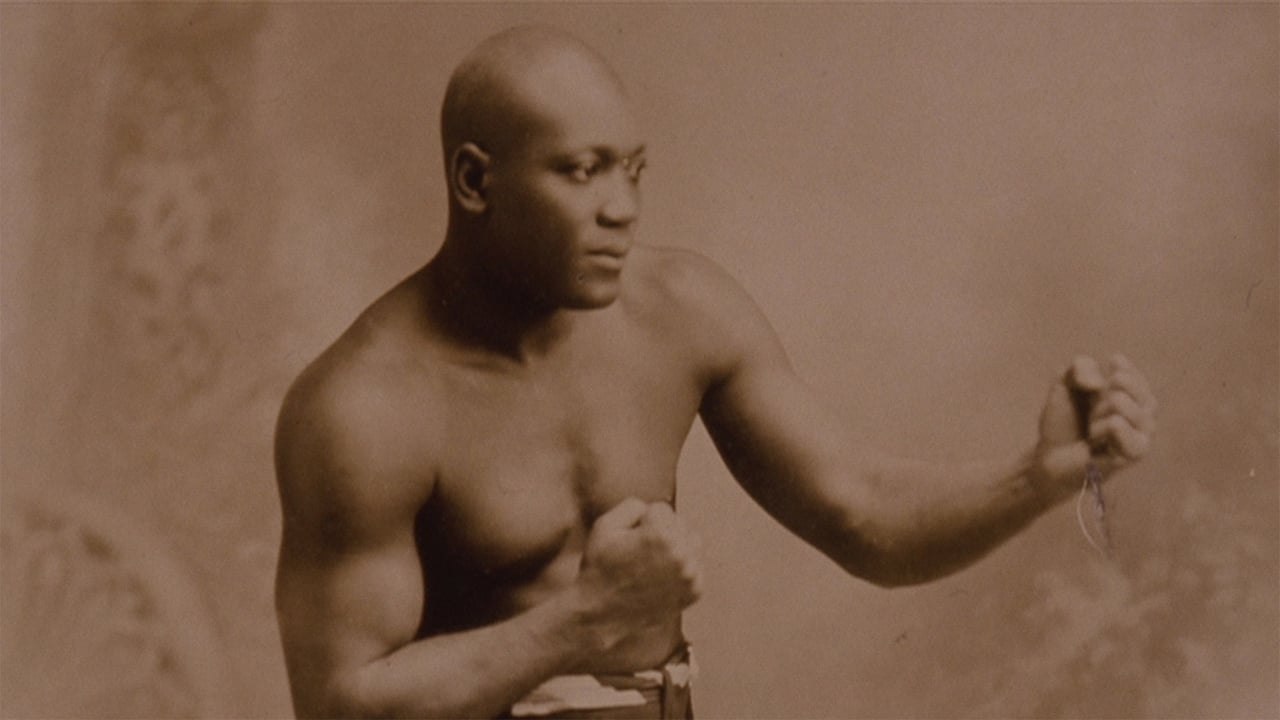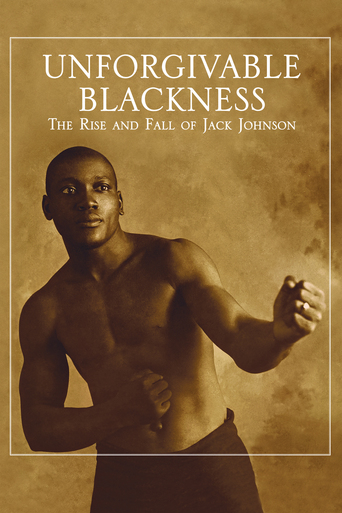

The greatest movie ever!
... View MoreReally Surprised!
... View MorePretty Good
... View MoreTells a fascinating and unsettling true story, and does so well, without pretending to have all the answers.
... View MoreThis is an amazingly long and detailed biography about the first black heavyweight boxing champion, Jack Johnson. In an era where blacks were, at best, second-rate citizens, Johnson had a brashness and arrogance that made it even more difficult for white America to accept him. And, incidentally, many black Americans disliked him as well. This was because he slept with prostitutes--many of them. And, many of these women were white--a sin which few seemed willing to forgive. As a result, even though he was the undisputed champ, he was often reviled. Many will be amazed at just how horrid the hatred was--with vile comments by supposedly upright citizens and newspaper accounts that are embarrassingly hateful. What happened next, you'll just need to see for yourself--but much of Johnson's downfall, unfortunately, was his own doing."Unforgivable Blackness" is a perfect or near perfect film. Some might balk at the great length of the film, but is grand style and quality are apparent throughout the movie. Incidentally, if you want to see more about this amazing but flawed man, try watching "The Great White Hope" with James Earl Jones, a slight reworking of the story of Johnson.By the way, it's not a major beef, but this show repeats a very commonly accepted myth. While President Woodrow Wilson was a horrible man (don't even get me started...), the comments he supposedly made after seeing the racist film "Birth of a Nation" were actually never made. The Writer Thomas Dixon apparently made up this quote. Do a little research on the web, you'll see what I mean.Also, although they never mentioned it in the film, it was illegal for a black and white couple to marry in many states in the US at the time and remained so until the early 1960s. Sad.
... View MoreAs a youngster I heard about this man Jack Johnson. Even then I thought those same stories were fiction. Afterall, no one could convince me that, in the early 1900's a black, Negro, could have possibly conducted his life in such a way to disdain social mores not only to the degree in and of itself, but more so in his audacity.Marrying and dating white women?? Come on. And he did not get killed? It shows that even for those times, America had this certain elasticity in dealing with a unique personality such as Johnson's.This movie weaves his life thoughtfully, slowly (a 2 disc set after all) and with dignity. The voices that contributed to this story is so widely varied that I implore you to check the movie's credits. From Ed Harris, Kevin Conway, Samuel L. Jackson and the lead narrator, Keith David. But these voices aren't the complete range of contributors. For this kind of talent to come together is a testament to the power of the story and the pull that director Ken Burns commands.Unforgivable Blackness ... is a powerful, thought provoking part of the American Experience. To that end, PBS deserves continued credit for bringing history to the masses.Humbly Submitted and with deep emotions, Ron W.
... View MoreARE SPOILERS POSSIBLE FOR HISTORICAL DOCUMENTARIES? IF SO, THERE MAY BE SOME HERE.This inaccurate, intellectually dishonest propaganda puff piece represents a new low for ultra-PCers Burns and Ward. They have done their mightiest to make a hero out of a self-indulgent thug, making a mockery out of historical reporting in the process.Jack Johnson was indeed a man of the future: he would fit right in with the egomaniacal, spoiled-rotten sports "heroes" that are so prevalent today. In a sense, he had great courage, demanding liberties and privileges that the society of his day (virulently racist, by today's standards) considered monumental affronts. But his brand of courage was more a form of supreme gall, borne by an overbearing sense of special entitlement. There can be little doubt his behavior promoted racism by appearing to confirm the worst fears whites held toward black men that they were, at heart, irresponsible brutes with an insatiable lust for white women. Contrary to the subliminal thesis here, Johnson was anything but a social reformer blazing a trail to freedom.Other heroic qualities are magnified out of proportion here, with editorial sleights-of-hand. Johnson's quotes come almost entirely from a ghost-written autobiography, making him appear more articulate than he really was. The herculean physical courage attributed to him is not confirmed by the facts: His first three fights after winning the belt in 1908 (McLaglan, O'Brien, Ross) were six-round, no-decision exhibitions; the fourth (Kaufman) was a ten-rounder of the same variety. The fifth was supposed to be an exhibition, but middleweight Stanley Ketchel got too frisky, so Johnson sent him to the oral surgeon. The phony nature of these fights goes unnoticed by the documentary, except for the Ketchel episode.Thus, Johnson's first real title defense was the 1910 bout against Jeffries, who had not fought in six years. Johnson held the crown for five years after this, during which he made only four defenses. By contrast, the man he dethroned Tommy Burns had made 12 defenses in the previous two years. (Interestingly, Burns weighed only 168 for the Johnson fight, about 10% below his normal fighting weight.) The film apparently ignores only one of Johnson's fights as champion a draw. That seems to be a telling omission. (Perhaps it was mentioned in passing ; I DID blink a couple of times.)In the end, Johnson was toppled by untalented strongman Jess Willard, and here Burns & Ward go unbelievably astray. They ascertain Willard was 27 at the time, "a full decade younger" than the champion. The challenger was actually 33, a fact Burns & Ward obliquely acknowledge earlier, if your arithmetic is better than theirs. They note at one place Willard began his boxing career the day after the Johnson-Jeffries fight (1910); a little later, they report Willard started boxing at 27. That would have made him 32 at Havana in 1915 almost correct.Was Johnson unmercifully persecuted by the government, as Burns & Ward claim? Yes and no. While the Mann Act was not inspired by the practice of rich men traveling with their in-house concubines, Johnson was clearly guilty of violating it. His selective prosecution probably had some racial motivation, but Johnson's violations were so blatant and well-publicized, he might well have been prosecuted if he had been white.Ken Burns' Civil War series (1990) was criticized by the PC lobby for being insufficiently anti-Confederate and driven by a white southerner (Shelby Foote). Ever since, he has been an increasingly obsequious afro-centric. It is getting pretty tedious.
... View MoreI saw this film at the 2004 Toronto International Film Festival. It may seem hard to believe, but I've never seen a Ken Burns film. I've always meant to, of course, but watching a multi- part documentary series is something of a commitment. So I jumped at the chance to see an entire film in one sitting. Clocking in at an impressive 218 minutes (and including a short intermission and a lively Q&A session, I was in the theatre for almost 4½ hours), I was hoping that the quantity would be matched by the quality. I was not disappointed.Jack Johnson was a true original. The first black man to hold the heavyweight boxing championship, he was a self-assured man who dressed well, drove fast cars, and kept white women as girlfriends. While not unusual now, this was highly irregular a hundred years ago, at a time when black lynchings were at their peak and the press regularly printed offensive cartoons to go along with its racist rhetoric. In the ring, he was a highly intelligent boxer, favouring a defensive style unknown in his day. He was also incredibly sensitive and articulate, especially for a man with only five years of formal education. But the struggles Johnson faced were almost insurmountable. No white champion would agree to fight a black man. Jim Jeffries preferred to retire undefeated rather than face Johnson, and Johnson had to travel around chasing champ Tommy Burns, hounding him to give him a title shot. When Burns finally agreed to a fight in 1908 (for a purse of $35,000, an unbelievable sum in those days), the contest wasn't even close, with Johnson dancing around, taunting his opponent, and talking to people in the ringside seats. The police stepped in during the fourteenth round to prevent him from knocking out the badly beaten Burns.Johnson held the title from 1908 until 1915, with his most famous bout in 1910, against ex- champ Jeffries, whom he soundly defeated. This led to race riots all over the country, and many people were killed. From the moment he won the championship, it seemed that white society looked for ways to discredit him. The press were relentless, printing hostile editorials and calling for a "Great White Hope" who would return boxing's crown to its rightful place (and race). When a 37-year old Johnson finally lost the championship to Jess Willard, a giant man ten years his junior, it seemed to many that the black race had been taught an important lesson.Johnson's life was troubled, and he continued to face persecution from the press and even law enforcement, who prosecuted him on charges related to his "debauchery" with white women. He eventually served a year in prison. There would not be another black heavyweight champion until Joe Louis, 22 years later.This is a remarkable film for many reasons. First of all, in the little-known story of Jack Johnson, Burns has found a microcosm of the racial situation of the day, and one that has many echoes even now. Muhammad Ali, after seeing James Earl Jones portray Johnson in the Broadway play "The Great White Hope" (later made into a film), declared that Johnson's life story was similar to his own. A black man choosing to live as a free individual on his own terms is something that is still hard for some white people to tolerate.Burns' film is also remarkable for the way in which it uses actual archival film of Johnson's bouts. Using silent film, Burns and his crew have added sound effects such as crowd noise and the sounds of blows connecting, and it gives these scenes the visceral punch they require. Finally, the superb "talking heads" (including the late George Plimpton, James Earl Jones, and the witty Stanley Crouch) and voice talent (Samuel L. Jackson is the voice of Johnson; others include Billy Bob Thornton, Derek Jacobi, Brian Cox, and Alan Rickman) bring the extraordinary story of Jack Johnson vividly to life.As an added bonus, you get to hear James Earl Jones say "balls". Twice.(9/10)
... View More